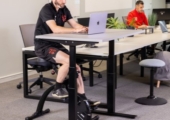To provide the best experiences, we use technologies like cookies to store and/or access device information. Consenting to these technologies will allow us to process data such as browsing behaviour or unique IDs on this site. Not consenting or withdrawing consent, may adversely affect certain features and functions.
The technical storage or access is strictly necessary for the legitimate purpose of enabling the use of a specific service explicitly requested by the subscriber or user, or for the sole purpose of carrying out the transmission of a communication over an electronic communications network.
The technical storage or access is necessary for the legitimate purpose of storing preferences that are not requested by the subscriber or user.
The technical storage or access that is used exclusively for statistical purposes.
The technical storage or access that is used exclusively for anonymous statistical purposes. Without a subpoena, voluntary compliance on the part of your Internet Service Provider, or additional records from a third party, information stored or retrieved for this purpose alone cannot usually be used to identify you.
The technical storage or access is required to create user profiles to send advertising, or to track the user on a website or across several websites for similar marketing purposes.
 An idea that has never really gone away, but which seems to be enjoying a new lease of life is the tabula rasa. The conception of people as a blank slate is something that has crept back into mainstream political and social thought for a variety of reasons. Arguably, it is also behind many of the most misleading notions about work and workplace design, perhaps most importantly that a change to some single element or characteristic of a working environment will lead to a specific outcome in the behaviour of people. More →
An idea that has never really gone away, but which seems to be enjoying a new lease of life is the tabula rasa. The conception of people as a blank slate is something that has crept back into mainstream political and social thought for a variety of reasons. Arguably, it is also behind many of the most misleading notions about work and workplace design, perhaps most importantly that a change to some single element or characteristic of a working environment will lead to a specific outcome in the behaviour of people. More →
















 While millions of words have been dedicated to the expected changes in post-Covid workstyles – how will people work, where will they work, how will they be supported – very little has been said about their employers: companies and corporations. Yet the anticipated changes to work and the workplace raise questions about the role of the company. Is it one just half of a transaction between employer and employee? Or is it something more? Indeed, what is the role of the company in the modern economy? Is the nature of the company likely to change? The answers could have a greater impact on workstyles than the pandemic.
While millions of words have been dedicated to the expected changes in post-Covid workstyles – how will people work, where will they work, how will they be supported – very little has been said about their employers: companies and corporations. Yet the anticipated changes to work and the workplace raise questions about the role of the company. Is it one just half of a transaction between employer and employee? Or is it something more? Indeed, what is the role of the company in the modern economy? Is the nature of the company likely to change? The answers could have a greater impact on workstyles than the pandemic. 

















December 19, 2023
Flexible working is delivering the gift of seasonal productivity
by Frank Weishaupt • Comment, Flexible working, Technology